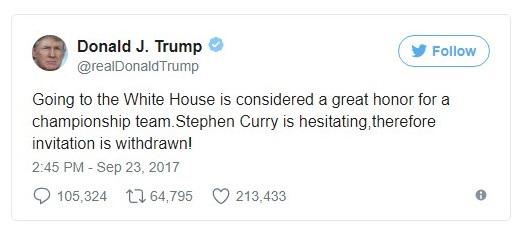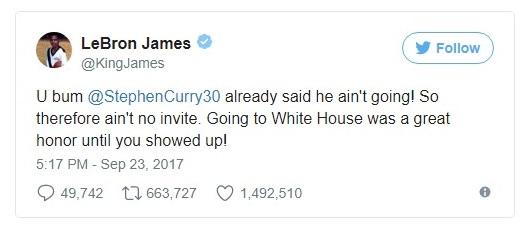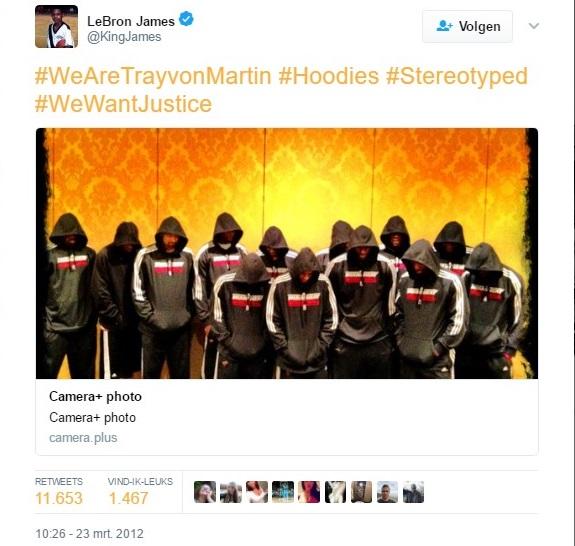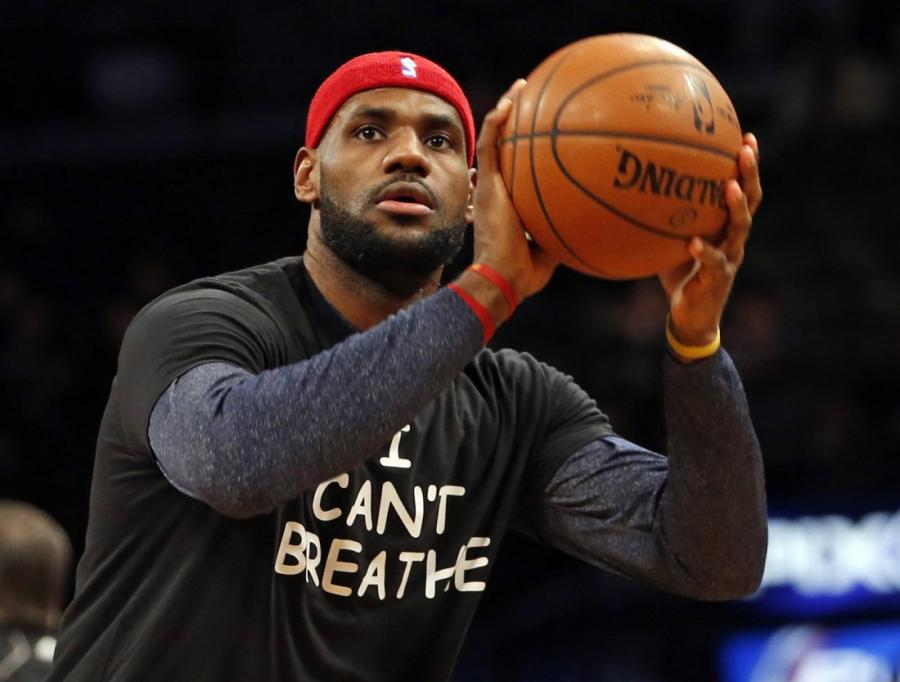
How basketball All-Star player LeBron James becomes a public intellectual
The Importance of the Activist Sports Star
In 2012, LeBron James, arguably the best basketball player in the world and already one of the all-time greats in American sports history, decided it was time to step up. Since then, he has made several public statements relating to the deaths of Eric Gardner and Trayvon Martin, and in favor of Black Lives Matter. His case is an example of how a sports superstar, using his exemplary role in society, can influence the public debate and raise awareness among fellow citizens.
Over the course of the last couple of years, ever more (black) athletes in the US are engaged in the debate over race, social justice and athlete activism. Especially James (1984) intervenes in these discussions on a regular basis. After Trump won the US elections, James stated on Instagram: ‘’Parents and leaders of our children please let them know they can still change the world for the better! Don’t lose a bit of faith! […] To all the youth out there I PROMISE I’ll continue to lead u guys every single day without no hesitation!!’’
He kept his word. A couple of days ago James gained international attention when he expressed sincere criticism on Donald Trump. The US president did not show any appreciation for American football players who kneel or sit during the anthem to protest police brutality against black Americans. Subsequently, Trump cancelled the traditional yearly meeting between the basketball champions - in this case the Golden State Warriors, with its star player Stephen Curry - and the president:

Donald Trump cancelled the traditional yearly meeting between the basketball champions and the president.
James responded to this tweet as follows:

James expressed criticism on Donald Trump via his Twitter account.
Later James added that he would not ''let one individual, no matter the power, no matter the impact that he should have or she should have, ever use sports as a platform to divide us. [...] The people run this country. Not one individual. And damn sure not him.''
These statements from James are not an isolated case. Approximately five years ago, James raised his voice for the first time, after the innocent seventeen-year-old Trayvon Martin was killed by police officer George Zimmerman in Sanford, Florida. On this fatal day, Martin was perceived as a threat because he was wearing a hoodie. The youngster, who was a big fan of James’ Miami Heat, was shot after leaving his house during the half time break of the NBA All-Star game. James took the initiative to make a powerful statement: the entire Miami Heat team posed for a picture all wearing the iconic hoodie sweatshirt. Subsequently, he shared this picture via social media.

The Miami Heat team posing while all wearing a hoodie in respect to the deceased Trayvon Martin.
As James grew up in Akron (Ohio), in one of America's many disadvantaged districts, this racial murder could just as easily have happened to him or one of his relatives. He would later state: “It was very emotional, an emotional day for all of us. Taking that picture, we’re happy that we’re able to shed light on the situation that we feel is unjust.” The Nation’s Dave Zirin added that James’ message should not be underestimated: ‘’The fact that LeBron James has used his exalted platform to speakout for Trayvon and his family even at the risk of his own bottom line, should be in these dark days, a great source of hope.’’
It is important that a celebrity sports star takes his or her responsibility in the public sphere, which is where, according to Jürgen Habermas, citizens form a public opinion and where matters of social interest are discussed, aiming at consensus and without being subjected to coercion (Habermas, 1991). However, apart from a few athletes in the US in recent years, we rarely hear sportsmen and women taking a stance on matters of general concern. This raises the question why there are so few athletes raising their voices? They should intervene more often in the public sphere when they feel that their norms and values are in danger.
Why are so few athletes raising their voices?
Two years after the racial murder of Martin, the fatal strangulation of Eric Garner sparked controversy in the US. During the warm-ups before a match in New York, James decided to address this sensitive subject by wearing the iconic 'I can't breathe' t-shirt. After this statement, former US president Barack Obama expressed his appreciation for James’ activist role in society and stated that other athletes should follow in his footsteps: "We went through a long stretch there where [with] well-paid athletes the notion was: just be quiet and get your endorsements and don't make waves. LeBron is an example of a young man who has, in his own way and in a respectful way, tried to say, 'I'm part of this society, too' and focus attention. I like to see more athletes do that...not just around this issue, but around a range of issues."

James wearing the iconic ''I can't breathe'' T-shirt during the warm-up before playing a match in New York.
Heynders (2015) has described how public intellectuals operate in society. A public intellectual offers a controversial and committed perspective from a side-line position, has critical perspectives and ideas and stimulates discussion regarding topics of ‘’political, social and ethical nature.’’ Moreover, it is important that (s)he addresses a big audience ‘’on matters of general concern’’ (Heynders, 2015, p. 3). Besides academics, writers and artists, sports stars could and should also stimulate the public debate more often. Athletes perform at a public stage - for a lot of fans - and therefore have a genuine opportunity to address matters of general concern. They should also take a social critical position when they feel their norms and values are in danger.
Last year, James added another two chapters to his role as an activist sports star. On the 13th of July 2016, he, together with three elite NBA stars, made a powerful and impressive opening statement at the prestigious ESPY sports awards, calling action on police violence against innocent black men. This statement led to a lot of positive reactions around the country. People watching the show were moved by this gesture. Former US president Bill Clinton tweeted that ‘’he was inspired by the words.’’
Carmelo Anthony, Chris Paul, Dwyane Wade, & LeBron James opening segment during the ESPY awards (3:33 min).
Later that year, James also decided to get politically involved. He was a strong supporter of the Hillary Clinton campaign during the US elections. Here he criticized (Trump) voters for ''being uneducated''. This is another example of how he uses his exemplary role in society in order to get people involved with matters of general concern.
Sports stars should dare to step up and raise their voices when they feel this is necessary! They can use their influence to stimulate the public debate.
Similarly to his honourable predecessors like Muhamed Ali, Jesse Owens, John Carlos and Tommy Smith, James captivates an activist role that goes beyond the ''sports are fun. Sports are entertaining. Sports are weird and goofy'' spectrum. According to The Nation's Dave Zirin, we should not underestimate the role sports stars can have in the public debate: "By breaching the walls of the sports world, we can puncture the ultimate privilege in our society: the privilege of blissful ignorance." LeBron James is a good example of an athlete who uses his responsibility, his status and personality to raise social awareness and he contributes in his own way to the Black Lives Matter movement. He seemingly does not worry about what his corporate sponsors might think (who contribute to a large degree to James’ yearly 54 million dollar endorsements).
It is important that international sports stars, who often have a lot of fans and followers, are aware that they have a specific platform to address matters of general concern to a large number of people participating in the public sphere. Sports stars should dare to step up and raise their voices when they feel this is necessary! They can use their influence to stimulate the public debate.
References
Baker, A., J Goodman, D., & Mueller, B. (2015, June 13). Beyond the Chokehold: The Path to Eric Garner’s Death.
Cacciola, S., & Mather, V. (2017, September 25). At N.B.A. Media Days, Players and Coaches Take Aim at President Trump.
Chan, A. (2016, June 13). LeBron James, Dwyane Wade, More Open ESPYS With Black Lives Matter Call to Action: ‘Enough Is Enough’.
Clinton, B. (2016, June 13). Inspired by the words of @LebronJames @DwyaneWade @CP3 @carmeloanthony tonight at the #ESPYS. [Twitter].
Feeney, N. (2014, December 8). LeBron James Wears 'I Can't Breathe' Shirt During Warm-Ups.
Habermas, J. (1991). The structural transformation of the public sphere: An Inquiry into a category of Bourgeois Society. Cambridge, United States: Massachusetts Institute of Technology.
Heynders, O. (2015). Writers as Public Intellectuals, Literature, Celebrity, Democracy. doi: 10.1057/9781137467645
Hirschfeld - Davis, J., & Belson, K. (2017, September 23). Trump Attacks Warriors’ Curry. LeBron James’s Retort: ‘U Bum.’
Laird, S. (2014, December 16). Black lives matter: Athletes' powerful statements still going strong.
Mandell, N. (2016, November 9). LeBron James on Trump's victory: 'If we continue the faith we will be alright'.
Miller, J. (2014, December 19). Obama talks about LeBron James and his "I can't breathe" shirt.
The Richest. (n.d.). LeBron James Net Worth.
Wilstein, M. (2016, July 14). LeBron James and Co. Open ESPYs With Powerful Black Lives Matter Speech: ‘Enough Is Enough’.
Zillgitt, J. (2014, December 9). LeBron James again demonstrates social conscience with 'I Can't Breathe' shirt.
Zirin, D. (2012, March 25). Trayvon Martin’s Death, LeBron James and the Miami Heat.